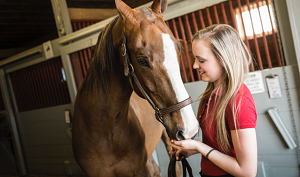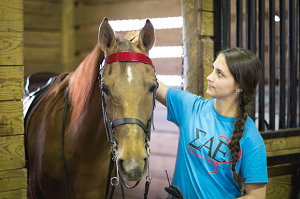How Pre-Vet students learn animal welfare assessment
 According to the American Veterinary Medical Association (AVMA), “an animal is in a good state of welfare if (as indicated by scientific evidence) it is healthy, comfortable, well nourished, safe, able to express innate behavior, and if it is not suffering from unpleasant states such as pain, fear, and distress.
According to the American Veterinary Medical Association (AVMA), “an animal is in a good state of welfare if (as indicated by scientific evidence) it is healthy, comfortable, well nourished, safe, able to express innate behavior, and if it is not suffering from unpleasant states such as pain, fear, and distress.
The AVMA outlines eight principles in animal welfare, including:
- The responsible use of animals for human purposes, such as companionship, food, fiber, recreation, work, education, exhibition, and research conducted for the benefit of both humans and animals, is consistent wih the Veterinarian’s Oath.
- Decisions regarding animal care, use, and welfare shall be made by balancing scientific knowledge and professional judgment with consideration of ethical and societal values.
- Animals must be provided water, food, proper handling, health care, and an environment appropriate to their care and use, with thoughtful consideration for their species-typical biology and behavior.
- Animals should be cared for in ways that minimize fear, pain, stress, and suffering.
- And more.
At the Intercollegiate Animal Welfare Judging and Assessment Contest (AWJAC) held annually by the AVMA hosts veterinary students and pre-veterinary bachelor’s degree students from all over the country to practice assessing the welfare of animal species in a number of settings, including large animals, small companion animals, biomedical research and human assistance.
 According to Dr. Cia Johnson, director of the AVMA’s Animal Welfare Division, the curriculum “relies on hypothetical virtual and live scenarios that are observed and evaluated in terms of the animals’ health and performance, affective state, and ability to engage in natural behaviors.”
According to Dr. Cia Johnson, director of the AVMA’s Animal Welfare Division, the curriculum “relies on hypothetical virtual and live scenarios that are observed and evaluated in terms of the animals’ health and performance, affective state, and ability to engage in natural behaviors.”
Highest scoring students in each division — undergraduate, veterinary and graduate students — are given awards.
“The event is an excellent opportunity for participants to hone not only their animal welfare knowledge, but also their skills in critical thinking, reasoning and oral presentation. Another major benefit is the opportunity to connect and network with animal welfare experts, students and veterinarians from throughout North America and beyond,” said Johnson.
The AWJAC currently has three interactive quizzes available online, which are based on previous AWJAC events. Pre-vet degree students can take these quizzes to test their animal welfare assessment skills on working horses, working dogs, and llamas on two fictional breeding farms.
Animal welfare is a crucial component of every veterinary professional’s work, but careers specific to this component are growing – including those in advocacy and policy, which will be the focus of our next pre-vet blog.

